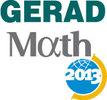HEC Montréal, Canada, 6 - 8 mai 2013
Journées de l'optimisation 2013
HEC Montréal, Canada, 6 — 8 mai 2013

WB2 Localisation et conception de réseaux II / Location and Network Design II
8 mai 2013 13h30 – 15h10
Salle: Nancy et Michel-Gaucher
Présidée par Jean-François Cordeau
4 présentations
-
 13h30 - 13h55
13h30 - 13h55Hub Line Location in the Design of Public Transportation Network
The hub line location problem in public transportation consists of designing a rapid transit line that minimizes the total weighted travel time taking into account the presence of alternative modes of transportation and transferring times. Some algorithms based on the Benders decomposition method are proposed to solve the problem. Computational results show that these algorithms outperform the CPLEX on all instances.
-
 13h55 - 14h20
13h55 - 14h20Competitive Hub Location-Pricing Problem
In this talk, we investigate configuring a hub network and determining its service price for an operator entering a market with an existing operator. Assuming static competition, a mixed integer nonlinear programming model and a hybrid genetic algorithm with the Fibonacci search method are proposed to tackle the problem.
-
 14h20 - 14h45
14h20 - 14h45Dynamic Facility Location with Generalized Modular Capacities
We introduce a facility location problem with multiple time periods, multiple commodities and multiple capacity levels, where the costs for capacity changes are based on a cost matrix. A strong mixed integer programming model is presented that unifies several existing problems found in the literature.
-
 14h45 - 15h10
14h45 - 15h10Simulation of a Physical Internet Based Transportation Network
This presentation is based on the Netlogo´s simulation of the distribution of road transportation services based on the physical internet. Based on this idea, instead of hauling trailers from origin to destination using a single tractor, freight is hauled from hub-to-hub, using different tractors allocated to one specific hub.

